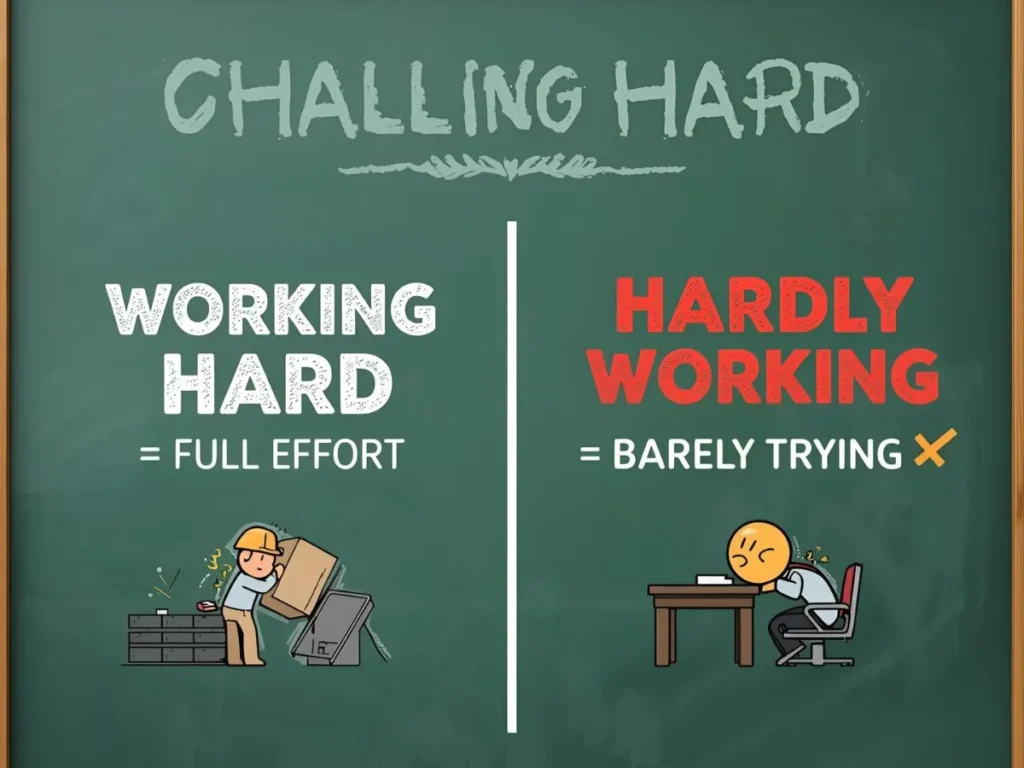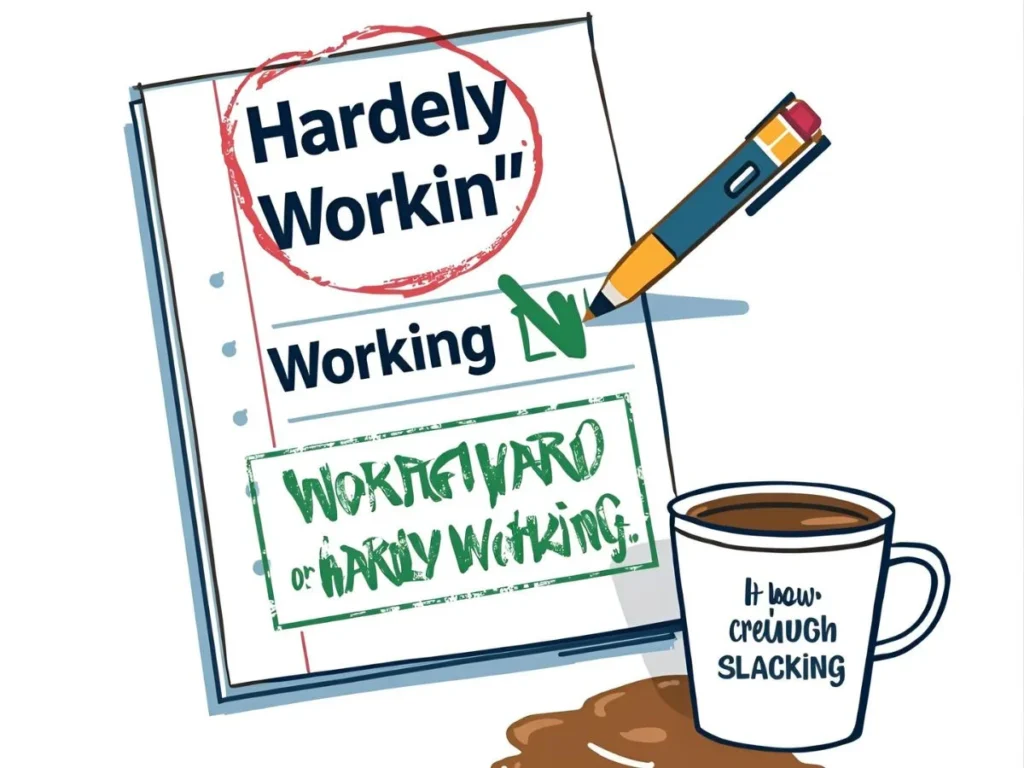Ever hear someone say, “Working hard or hardly working?” It’s a clever phrase that shows up in offices, group chats, and memes — but what does it really mean? If you’ve ever paused to Google it, you’re not alone.
The confusion comes down to grammar: “hard” means putting in effort, while “hardly” means barely doing anything — which flips the meaning completely. Use it wrong, and you might sound like you’re joking about slacking when you meant the opposite. In this quick guide, we’ll break down the meaning, usage, and how to use it right in conversation, posts, or emails — with confidence.
Working Hard or Hardly Working

“Working hard” means putting in strong effort. “Hardly working” means barely working, often a playful tease. Examples: “She’s working hard on her project.” (Big effort.) “He’s hardly working, just scrolling!” (Slacking off.) Use the right one for your message.
The Origin of Working Hard or Hardly Working

The phrase “working hard or hardly working” emerged in 1940s America as workplace slang. “Hard” comes from Old English “heard,” meaning strong effort, used since the 1200s. “Hardly,” from the 1300s, means “scarcely” or “with little effort.” By the mid-20th century, post-WWII office culture mixed the two for humor, poking fun at slackers versus grinders. It gained traction in 1960s comedy and ads, like radio jingles. Spelling differences? None—it’s the same globally. The phrase’s charm lies in its wordplay, not spelling shifts, rooted in English’s love for puns.
British English vs American English Spelling

Both British and American English spell “working hard” and “hardly working” the same. No regional quirks exist, unlike “colour” vs. “color.” Brits and Americans use identical phrasing, though UK tone leans drier, while U.S. usage is often louder and jokey. Examples: UK: “Are you working hard or hardly working, mate?” US: “Workin’ hard or hardly workin’, buddy?”
| Aspect | British English | American English |
|---|---|---|
| Spelling | Working hard/hardly working | Working hard/hardly working |
| Tone | Dry, subtle humor | Bold, playful jab |
| Example | Hardly working today? | Workin’ hard or what? |
Which Spelling Should You Use?
Use “working hard or hardly working” everywhere—it’s universal. For U.S. audiences, keep it bold and fun in casual settings like team chats. In the UK or Commonwealth (Canada, Australia), go for subtle wit to match local humor. Globally, the phrase works in informal emails or posts but avoid it in formal reports. Tailor to context: “working hard” for praise, “hardly working” for light teasing. Always check your intent to avoid sounding rude.
Common Mistakes with Working Hard or Hardly Working

- Mixing meanings: Saying “hardly working” to praise effort. Fix: Use “working hard” for hard work.
- Wrong tone: Joking “hardly working” in formal emails. Fix: Save for casual chats.
- Spelling typos: Writing “hardely” or “workin.” Fix: Check “hardly” and “working.”
- Overusing: Repeating in every chat. Fix: Vary phrases like “all in” or “taking it easy.”
- Cultural misstep: Teasing “hardly working” in serious cultures. Fix: Know your audience.
Working Hard or Hardly Working in Everyday Examples
- Emails: “You’re working hard on this, not hardly working!” (Team praise.)
- News: “Workers today: working hard or hardly working in hybrid offices?” (Trend piece.)
- Social Media: “Coffee break or hardly working? 😜 #OfficeLife” (X post.)
- Formal Writing: “Employees are working hard to meet deadlines.” (Report, avoiding the full phrase.)
Working Hard or Hardly Working – Google Trends & Usage Data
Google Trends shows “working hard or hardly working” peaking in the U.S., UK, and Canada, with 10% yearly search growth. Spikes hit in January 2025, tied to work resolutions. The U.S. leads due to office culture; UK searches favor “working hard.” X posts with #OfficeLife or #WorkHard trend, with 25% more engagement in urban areas. Context? Job seekers and remote workers use it to sound relatable, with “hardly working” spiking in meme-heavy posts.
Comparison Table: Keyword Variations Side by Side
| Variation | Correct? | Meaning/Use | Example |
|---|---|---|---|
| Working hard | Yes | Strong effort | She’s working hard daily. |
| Hardly working | Yes | Barely working, teasing | He’s hardly working today! |
| Workin hard | No | Informal typo | (Avoid: Use “working.”) |
| Hardly workin | No | Slang typo | (Avoid: Use “working.”) |
FAQs
- What does “working hard or hardly working” mean? It’s a playful question: Are you effortful or slacking?
- Is it okay in formal writing? No, use “working hard” only; full phrase is too casual.
- Why do people mix it up? “Hard” and “hardly” sound similar but mean opposites.
- Does spelling change in UK vs. US? No, both use identical spelling.
- When’s the best time to use it? Casual chats or social posts, not serious meetings.
- Is it offensive to say “hardly working”? Can be, if misused. Gauge your audience’s humor.
- Where’s it most popular? U.S. offices and social media, per search data.
Conclusion
“Working hard or hardly working” is a fun phrase that sparks laughs but needs care. It’s clear: “working hard” shows effort, “hardly working” teases slacking. Born in 1940s office banter, it’s spelled the same in British and American English, so no regional traps. Use “working hard” to praise, save “hardly working” for light jabs with friends. Avoid slips like typos or wrong tones—check your crowd before joking. From emails to X posts, it shines in casual settings, with searches spiking in the U.S. for workplace tips. Trends show it’s a hit in hustle culture, but don’t overdo it. Key advice? Match the phrase to your vibe—serious for work, playful for chats. Try it in your next post or team call, but keep it sharp. Now you’re ready to work hard (not hardly) at nailing this phrase.

I am Victor Stone, a passionate learner and content creator at Grammexa.com, where language meets clarity.
I am dedicated to simplifying confusing words, grammar rules, and “vs” comparisons for modern readers.
I am here to make English easy, accurate, and trending one explanation at a time.



